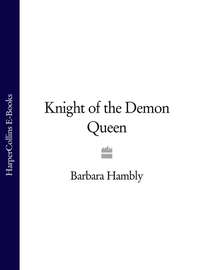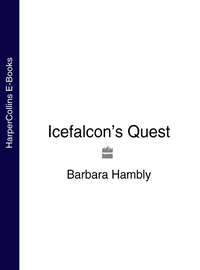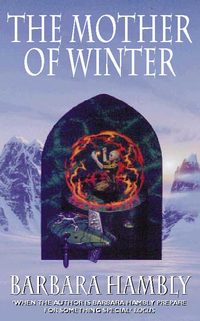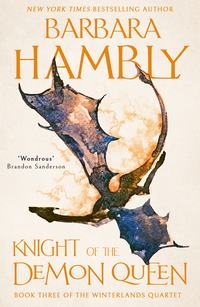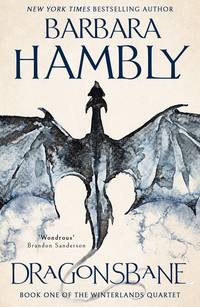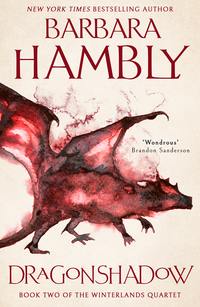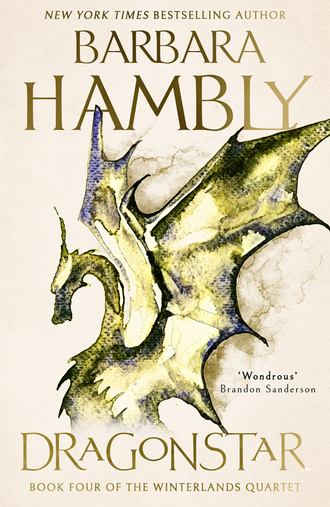
Полная версия
Dragonstar
North and west, rising sun razored shadows among the stones. Details of the landscape unfurled exaggerated ribbons of blue-black, throwing into prominence each minute pebble and hillock. Another dust-devil appeared out of nowhere, skated frenziedly through the piled sand, then petered itself out in the desert beyond.
I confess I was surprised that the magics of those little wizardlings who haunted the computer nets actually worked. I took refuge in that world precisely because magic no longer operated there. The energies of etheric plasma by which those people power their machines has a tendency to damp certain other forms of magic—because of course it is itself a form of magic. But that world’s own magic was so attenuated that it was easily snuffed out.
“Doesn’t mean people aren’t still being born there who could have worked it, had it still existed. You got out of the second box with no trouble, then?”
As if recalling a dream, John glimpsed the image of the dragon emerging like smoke from the duplicate box, which was tucked behind a complete set of Clivy’s Speculations. On the same high shelf were concealed the silver bottle in which Aversin had dipped an extra cup or so of the water from the spring in the Hell of the Shining Things, the rune-written sword given him by the League of the White Black Bird, and all the notes he’d made on his travels, grimy rolls and wads of parchment and papers all creased from being stuffed in his doublet pockets. Gareth must have gotten hold of them from Ector’s guards.
And like a second dream he saw the young Regent sleeping, as the Demon Queen had shown him, with Amayon in the guise of the Lady Trey sitting smiling beside his bed.
John’s belly clenched.
“Take me back.”
Don’t be a fool.
“You think every day you delay the demons won’t get stronger?” John shaded his eyes to look up at the dragon’s haughty profile, high above his head. “Whether Folcalor wins out over Adromelech or t’ other way around, whichever one ends up Lord of the Hell beneath the Sea, he’ll come after you, son. And either way they’ll do whatever they have to do, to get out of you whatever they went into the next world to get. And if you think they won’t, you’re joking yourself.”
They cannot come at me here.
The dragon spread his wings, and evening sun speared John’s eyes, when it had moments ago been only an hour after dawn. The dry air turned moist and thick in his nostrils, laden suddenly with copal, plumeria, and frankincense. He heard men murmuring, and saw the city before him restored in its myriad beautiful hues. Painted walls, pillars of porphyry and malachite, rivaled the flowers on a thousand terraces and vines. Everything was startlingly clear, too, and he understood that he was seeing the dragon’s memories. Watching with the dragon’s hyperacute sight.
The circle of stones stood where it had been last night. With a dragon’s far-reaching perceptions, John could even make out the faces of the ten people in that vast ground, seven men and three women, the youngest of them probably over sixty. They held hands, forming a ring that looked tiny in that open expanse of dun-gray dust. The chip of brightness in the ring’s center was indeed water, a puddle that seemed barely larger than John’s palm. But it caught the light of the torches, as it had caught that of last night’s waning moon. The air above that fleck of water wavered with the greeny-silver luminosity of the Sea-wights; John felt their power, smelled the metallic vileness of them even at this great distance—the dragon’s sense, not his own. Wind scoured from the hills, made dust-devils among the encircling menhirs.
Where the comet had wavered in the sky last night, only clean, pale twilight glimmered now.
They were astronomer-priests, as well as mages, said the dragon’s voice in his mind. They understood enough of the nature of the Dragonstar so as to be able to hold against the magic the demons derived from it, until the Dragonstar ceased to rise, and its alien power faded away.
Outside the Henge walked others, yellow-robed like those within. Some of them were very young. Some bore the marks of combat, burns and scars and half-healed claw-rakes. One had been marked, as John had been marked, with the silvery half-seen tracery of demon runes, that gleamed strangely in the sun’s dying light. Two or three wept as they paced.
They bent to draw signs in the sand between the stones with sticks of what looked like wax or chalk. Jen’ll skin me if I don’t give her a sketch of that, John thought, and concentrated his borrowed eyesight on the marks, memorizing as he had taught himself to memorize the small differences of animal tracks in the snow of the Winterlands, and the coded signs of hundreds of bandit and Icerider gangs. All these mages chanted and whispered as they traced the symbols, words that John could not make out, and within the stone circle the ten priests swayed, lined, calm faces blanched by the sicklied demon light.
When that light faded, leaving only the shining handbreadth of water, the ten priests retreated from one another, each drawing a circle of protection separate from the others. The silence in the city square beyond the Henge was like doom, though far off John heard a man in the hushed crowd weep.
Each priest within the Henge—within each separate protective ring—took a bottle from the robes they wore. Men and women, they knelt in their individual ward-rings, and drank. Then they lay down, and covered their faces with their cloaks. The torches carried by the warriors who lined the city square burned smoky in the waning daylight. The priests outside the barrier stones were still as the uncarved rocks.
John watched as, one by one, each of the ten mages whose strength had forced the Sea-wights into the shining water at the Henge’s center went into a brief convulsion, and died. As each died, faint light licked and glimmered along the edges of the encircling stones, seeming to leap from stone to stone like brightening fire. John said nothing, but he trembled as if he had witnessed a great battle. As indeed he had, he thought. A great battle’s end, and victory at a price he wasn’t sure he’d have had the courage to pay.
Then he was looking at the empty sands of morning, and the dust-devils that whirled and twisted where even the ruins had mostly perished.
The spells they put on the Henge permitted nothing to leave, said Corvin after a time. Not demons, and not the mages themselves. They wove their webs of spells upon the whole of the city, surrounding the Henge in an unbreakable Maze, and the magic that locked Henge and Maze they sourced in their own deaths. There is magic—tremendous power—in any human soul, that can be used when the soul dissolves in death. Greater magic still, if the soul be that of a mage.
Bugger, thought John. Grief for the lost mages pierced his heart as if he had truly seen their deaths and not merely a remembered echo ten centuries gone. As if they had been his friends, when he did not even know their names. Grief for knowledge that had been lost with those ten mages, knowledge that they had almost certainly lacked the time to pass along. The horrors he had seen in the other world, where demons had stalked their prey in the flooded streets, these seven men and three women had seen in their own world a thousand years ago. They’d given their lives to stop it, as he’d have given his life rather than call on the Demon Queen.
When the trouble started, he thought, they’d have had no time to teach their yellow-robed adepts anything but what they must know to do their own part in the spells of ward and mazery. No time to write anything down of all that other knowledge that had made up the length of their years.
Time is long, and words unsaid remain unsaid forever.
“How’d they get out, then?” John asked, determined not to let the dragon hear the sorrow in his voice. “Adromelech, an’ Folcalor, an’ the rest? I understand about the Dragonstar comin’ back, an’ the demons usin’ it to source spells, but if the spells the mages put on the Henge an’ the Maze are still that strong …”
The dragon turned his tassled head and regarded him in surprise tinged with impatience.
They did not escape, he said. Adromelech is still there, with the greater part of his demon horde. Did you think you were dealing with the full might of the Sea-wights, Dragonsbane? What you thought of as the Hell of the Sea-wights is only an enclave, to which Folcalor and his cohort escaped when the Star set for the last time. The gate of the true Hell still lies within the Henge. What else has Folcalor been waiting for these ten centuries but the chance to free his Arch-wight lord; the chance to take command of that Hell for himself?
John thought, Bugger.
All this time we’ve only been dealin’ with the advance-guard.
God’s grandmother …
“So to come to power over Adromelech”—he was astonished at how casual he sounded, through the dizziness of horrified shock—“to take true command—Folcalor has to break the Henge.”
Break the HENGE? The words were barely articulated, only the curling wave of the dragon’s incredulous scorn. BREAK the HENGE? You speak like a human—think you that anything can break through the magics of ten mages’ deaths, like a bumpkin kicking his way through a stable door? Folcalor is a fool.
“Folcalor had a good try at puttin’ together the deaths an’ souls of at least seven mages,” replied John. “Not to speak of what he’d get if he devoured Aohila—no wonder she sent me along to get you before they did.”
His demons would never have taken me, snapped Corvin, as if he hadn’t been trapped by the demons in his burning laboratory in a world where his own magic would barely function. Nor shall he, Dragonsbane. Not me, and not you.
Wind breathed across the remaining fragments of wall, the broken pillars and dry pits, and it smelled of emptiness beyond the endurance of man. John had heard of the deserts that lay east of the plain and steppe that were the farthest marches of the Realm of Belmarie, but had heard of no man crossing them. No tribes or hunters roved them as the Iceriders roved the cold tundra to the north. “Take me back,” he said again, and tried to keep the fear out of his voice.
To the demons that run squeaking through the halls of the palace where I came forth from the prison box? Scorn rippled in the dragon’s hot music. You think much of yourself if you fancy you can keep silent when they ask you where I went.
“My friends are there.” John saw Gareth again, asleep in his demon wife’s arms. Saw Gareth’s daughter Millença, only an infant in white satin when last he’d seen her, she must be three now—and Trey with a dead child in her womb that would be a demon as it was born.
The dragon regarded him blankly, truly not understanding what he meant by friends. In a thousand years, thought John, Corvin had not had friends. Perhaps never. Maybe it was not a thing of dragons—as the dragons said—to have friends, as it was not a thing of dragons to love.
You saved my life, said Corvin. Therefore will I preserve yours. You need not fear that I will not bring you food, and water, from the mountains, though they lie far. For myself there is gold here, abundant gold, hidden in the palace’s ancient crypt and the secret treasuries of a thousand nobles. Sweet gold, each coin and necklet and ring singing its own song of the earth it came from, the hands that wrought it, the fire that refined. You will be safe.
“I don’t want to be safe!” snapped John. But the dragon spread his wings and lifted weightless from the earth, like a thistledown of silver and black. Like a thistledown, Corvin rode on the desert wind, higher and higher, until he was indeed no larger than dandelion-fluff in the harsh blue desert sky.
FOUR

JENNY LISTENED TO the demons as they whispered in the dark.
So tangled were the passageways of the mines, the narrow tunnels that supplied ventilation and water, that near sounds and far were confused. Even a trained mage like Miss Mab had trouble casting her senses very far into the darkness of the mines. Sometimes a chance whisper near a ventilation shaft a half-dozen levels down would repeat a word nearly in Jenny’s ear, startling her to sweat-drenched alertness. Other times the sheer cold massiveness of the mountain’s rock deadened even the footfalls of the slave-gangs barely a hundred yards away.
Lying in the darkness, Jenny had a long time to accustom herself to the tricks and echoes of the mines.
Long ago, as a girl-child in the bandit-haunted Winterlands, she had learned to still herself to nothing. To listen, and sort sound from sound, until on summer nights in the attic of her house on Frost Fell she could tell the difference between the rustle wind made in the big hand-shaped leaves of the solitary oak on the south slope of the hill, and the lighter hissing of the birch leaves to the north. Just that sound would tell of the weather for days to come. In those days her powers were slight—this had been before the time of the dragon, before Morkeleb had transformed her into dragon form to fly with him, and in doing so had given her a strain of dragon magic. She had made up for her lack of ability by the most painstaking attention, by long meditation, the study of each star and pebble and raindrop. As Caerdinn had said, the more she knew, the greater would be her power.
This attention, this meditation, returned to her now in the dark. She sorted sound from echo, built words from inflection and rhythm of speech. The stillness in which she listened was like a dream, as if, in sleeping, she passed into the nothingness of the darkness itself. From this nothingness she reached toward the demon voices, bodiless as smoke.
She understood them. That was another thing that the demon Amayon’s possession had left in her mind.
“… seven hundred slaves here.” A gnome’s voice, deep and vaguely familiar. She thought it might be one of the guards who had shot her when she’d fallen into the pit-trap in the mine. He spoke in the tongue of the demons. “Folcalor will bring another two hundred at least.”
Two hundred? Jenny gasped, appalled. All through the North she had heard rumors for weeks of gnomes buying slaves. Not, as they ususally did, to work in the deeper levels of the mines, but paying good silver for children too young to work, cripples whose families wanted to be rid of their upkeep, grandparents who could no longer contribute to the harsh endless work of the Winterlands farms. The gnomes, as usual, denied these rumors as they denied all rumors of ever having human slaves. John had freed a band of them when he’d passed Tralchet Deep in the North—they’d warned him then of more sinister goings-on. The days were long gone when the King could send men into the mines to investigate—or do anything about whatever he might find.
But two hundred slaves? And seven hundred … where? In the Deep? The tunnels, Jenny knew, extended much farther north than most people knew, and there were entrances scattered through the great jagged mountain range of Nast Wall. With the Realm’s northern province of Imperteng in rebellion against the King all last summer, it would have been easy, of course, to bring in any number of such slaves. But seven hundred …?
How would they even move them unseen?
Morkeleb, she thought. He would know how far the tunnels of the Deep extended to the north; Morkeleb or Miss Mab. The dragon had gone to the surface, to lie on the black rocks far above the tree line, scrying the wind. Would he take note of a coffle that large coming out of the Wyrwoods? Or a succession of such trains? Or would he consider it not a thing of dragons, to care whether gnomes enslaved humans or not?
“And no luck with the dragon?” A man’s voice this time. Again, the timbre was familiar, as if Jenny had heard it before, speaking human words. The gnome must have shaken his head, because the man added a curse. “Unless we find the dragon, we’re wasting our time. All this …” By the flex in his voice Jenny knew he gestured to something—what? “… won’t give us a toad’s spit without her secret name. And you know Folcalor won’t listen if we say we can’t find him.”
“We’ll find him. Stinkin’ snake. Even if we don’t, those’ll give us power to find the catch-bottle that old Arch-Seer made.”
Those what? Surely if they’d blasted a tunnel to trap Morkeleb, they’d have known he escaped …
“What, in Ernine? With her power over all that land?”
Catch-bottle? The phrase was an old one, a spell Jenny had only heard of in the lore handed down by the Line of Herne. Since Caerdinn hadn’t been clear himself what it meant or how it worked—his master Spaeth having left the North with the last troops of the King’s last garrison—Jenny didn’t know, either.
“Her power can only reach so far. We know the bottle was lost when the mages went into the mirror-chamber. For certain she was never trapped in it, the bitch. So all we have to do is find it. How far can it have rolled?”
The man’s voice cursed again. “I’m not going after it, I can tell you …”
“Folcalor will go, and you’ll go with him or I’ll know why. With these here and the ones he’ll bring, that should give him the power to see through whatever blinds she can weave.”
These what? Jenny’s mind groped, and she wondered if she’d missed something in the shifting echoes, and the voices faded as the speakers moved away.
“… two days …” and “… Kings … damned glad to get the gnome-witch at last …”
Folcalor.
Jenny sat up, straining to follow the voices, but only the whisper of air moving in the vent shafts met her ears, and the cluck of subterranean streams.
Two days.
She felt absolutely cold.
Another two hundred slaves … seven hundred HERE. Here in the mines? Obviously in concealment with the collusion of one or several of the Lords of the Deep, but … seven hundred?
Those will give us power …
Those what?
Shakily, Jenny pulled on her skirt and her boots. To get to her feet she had to lean on the curve of the wall. The hip she’d twisted when she fell in the pit-trap twinged hard, making her stagger, but that, too, was already responding to the spells of healing Mab and Morkeleb had laid. Mab had brought a staff so that Jenny could limp as far as the latrine-bucket. Its tip was muffled in leather. Jenny groped it from beside her nest of blankets and hothwais, and stood.
Those will give us power.
Seven hundred slaves.
She listened in the darkness again but heard nothing. Not breath, not the murmur of voices, not weeping, not curses, not cries. Wherever the seven hundred slaves were, it was nowhere near where the two demons had been. So what were “those”?
From beneath the blankets she dug the little chip of hothwais Mab had left for light, and wrapped the cold-glowing stone in the folds of her overskirt, two and three thicknesses deep. So piercing was its light that by unwrapping a fold or two she could keep a muffled glow, like the faintest starlight, just enough and only enough to see.
I was once able to see in darkness, she thought. I should be keener-eyed now in dim light, even if not nightsighted as once I was. She focused her mind on calling that power to herself, calling it out of herself, and wrapped another fold of skirt around the stone. Then she slipped out of the chamber past the layers of straw mat, listening along the corridors for the direction in which she’d heard the voices.
It wasn’t far. In the long hours of silence and listening, she’d heard voices coming from that direction before. This was a section of the mines that had been worked out, short tunnels cut like the legs of a centipede off the long main lode. Jenny worked her way carefully from tunnel to tunnel in the darkness, listening and scenting. Even the most silent of slaves must sweat and breathe and piss. The smells of the mine were thin and cold around her, wet rock and clay and the old wood of the props. The sulfurous drift of blasting powder. Now and then the breath of the vent-shafts brushed her face, or riffled the silky black-silver stubble of her hair. She neither heard nor smelled demons, but wrapped another fold of her skirt over the hothwais nonetheless, fearing even the farthest glimmer of light that might alert them—or the mine-guards—to her presence.
How could they POSSIBLY have seven hundred slaves here? Bring them here, feed them, keep them silent …?
She smelled straw. Wet straw and clay.
And the next instant sensed the presence of others around her, other souls, other thoughts. It was as if she’d walked suddenly into an immense crowd, silently watching. But the thin stream of air along the walls had not altered. The echo of walls close on either side of her was unchanged.
No sound of breathing. No scent of sweat. Only the echo of weeping in her mind, the broken clamor of terror and grief and pain.
Utterly silent in the dark.
No smell of demons, either, nor the whisper of claws on rocks. Nothing of the faint shivering chime that their glass shells made when they scraped against stone. Cold air eddied out of the denser darkness of a tunnel mouth, and Jenny made note of her directions, counting right and left by notching the side of the staff with her knife. She slipped around the corner and advanced into the almost absolute dark.
People. The tunnel was filled with people. She knew it. Impossible, she could touch the walls with her hands! Yet she sensed people all around her, felt their presence. But not a whisper did she hear, not a sound. And no smell save that of damp baskets, of clay pots.
Fearing yet to risk more light, she strained her eyes, shifting the focus of them as once she’d learned to as a mage. The tunnel took another turning, and opened into a little chamber of the kind to which Mab and Morkeleb had carried her, a sort of catacomb whose ceiling made her stoop. The movement of the air there spoke of a small space, not a large one.
A few pots and baskets stood against the wall.
And that was all.
Kneeling, Jenny went to the nearest basket and removed its lid.
It was full of jewels.
Jenny blinked. A dream-vision came back to her … when? At the Hold? In the night-camp in the Snakewater Marshes, when she and Morkeleb were on their way here? It had been a dream of Folcalor, whom she’d recognized through Amayon’s memories of the demon rebel: Folcalor dipping his hand into a dish of jewels. A gnome’s hand, she recalled, powerful, the short fingers adorned with huge rings, slabs of opal and turquoise. She saw again how those stubby knotted fingers had stirred and rubbed the jewels, savoring them. This vision had made no sense to her when she’d had it: Folcalor had imprisoned the minds and souls of the mages he’d enslaved in jewels, Jenny’s mind and soul among them, but in her vision there were far, far too many jewels for that.
There hadn’t been that many mages born in all of time.
Hundreds …
She crawled a little farther and opened the next basket. It, too, was full of gems. Rough-cut crystals, glittering coldly in the darkness.
They mine gold in Ylferdun, she thought. Not gems. She scooped up two or three for a closer look.
And nearly dropped them in shock.
Dear gods!
The souls were in the jewels.
Not mages’ souls. She would have felt the magic there, the minds still clear and thinking and aware. But souls nonetheless. Weeping, some of them, as she had wept in her prison. Calling out to their husbands, or wives, or children, or parents, or friends, as she had called John’s name in despair.


